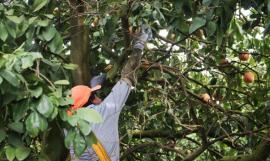
The Department of Agriculture, Land Reform and Rural Development (DALRRD) has announced a planned surveillance programme for African citrus greening disease in and around Gqeberha in the Eastern Cape.
The surveillance programme is an official process conducted to determine pest presence or absence in an area.
The planned surveillance programme follows the African strain of the disease, which was recently detected in the residential areas of Gqeberha.
African citrus greening disease is a bacterial disease of citrus trees, which is primarily spread or transmitted by the insect vector African citrus psyllid (Trioza erytreae).
The most characteristic symptoms on leaves of affected trees include blotchy mottling and yellowing of leaf veins.
The disease reduces the quality of fruit, making it unsuitable for sale as fresh fruit or for processing.
The department said during the planned surveillance programme, a delimiting survey will be administered to determine the geographic distribution of citrus greening (African strain) in the area as a basis for further consideration of whether the pest is widely distributed or not.
This is to enable the implementation of effective and efficient phytosanitary measures.
“For this survey, DALRRD will collaborate with Citrus Research International (CRI) to survey citrus trees for suspicious symptoms, and samples might be taken for laboratory analysis,” the department said in a statement.
The department has since informed nursery owners, including citrus growers and community members in and around Gqeberha, about the planned surveillance programme.
The department has urged the residents of Gqeberha and surrounding areas to cooperate with DALRRD and CRI officials, who will be working in and around their areas for surveillance activities.
Residents are also urged not to tamper with any of the department’s yellow sticky traps, as they collect valuable information.
Citrus greening is under official control in terms of the Control Measures R.110 of 27 January 1984 of the Agricultural Pests Act (APA), 1983 (Act No. 36 of 1983).
The intra-provincial movement of citrus propagation materials from infested areas to non-infested areas in the Eastern Cape is prohibited.
Infested areas include the districts of Alfred Nzo, OR Tambo, Buffalo City Metropolitan Municipality (Wards 1-10, 15, 16, 18, 19, 27-29, 31, 46, 47 and 50), Great Kei (Ward 1), and Nelson Mandela Bay Metropolitan Municipality (Wards 1-15, 32 and 39).
Some of the non-infested areas include the districts of Ukhahlamba, Amathole, Chris Hani, Nelson Mandela Bay Metropolitan Municipality (wards 16-31; 33-38; 40-60) and Cacadu.
“It is against this background that nursery owners, informal traders, citrus growers and community members are encouraged not to move plants and plant propagation material from infested areas to non-infested areas, unless such movement is authorised by means of a removal permit, in terms of the Agricultural Pests Act,” the department said.
Steenhuisen to launch national food survey launch
Meanwhile, Agriculture Minister John Steenhuisen will on Wednesday launch the findings of the National Food and Nutrition Security Survey (NFNSS) in Pretoria.
This after the DALRRD commissioned the Human Sciences Research Council (HSRC) to conduct the NFNSS between 2021 and 2023.
The survey was conducted in all nine provinces, with 10 reports produced, including one for each province and one national report.
The department said the survey’s findings offer insights into the current state of food and nutrition security in the country at the district sphere.
“The aim of the survey was to generate baseline data that government will utilise to provide targeted support interventions to households. Support to households is aimed at providing access to adequate food and nutrition towards food security,” the department said. – SAnews.gov.za


